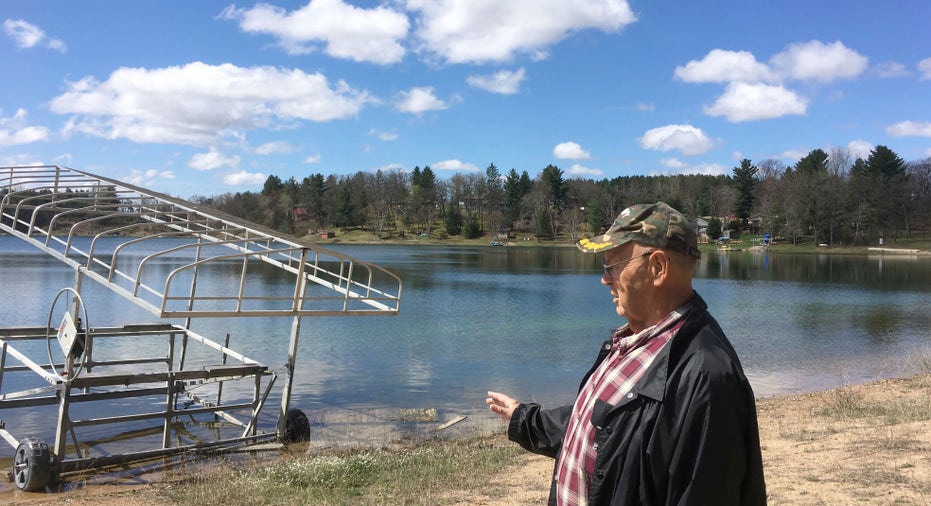Farms' thirst for water roils Wisconsin's central sands

TOWN OF OASIS, Wis. – Cris Van Houten thought he was getting a little bit of paradise when he built his house on Huron Lake in Wisconsin's central sands region. He could look out from his deck at the blue water and scuba dive in the shallows.
Less than 10 years later, he and his neighbors are watching their beloved lake dry up. The shoreline has receded at least 20 feet, leaving Van Houten with a new beach he never wanted, his dock high and dry, and scuba diving impossible.
Like other lake property owners, Van Houten blames the high-capacity water wells serving agriculture, particularly potato farmers. As the number of wells grows, Wisconsin finds itself in an unexpected fight. Despite being bordered on three sides by Lake Superior, Lake Michigan and the Mississippi River and cross-hatched with innumerable rivers, streams and lakes, the state no longer can take water for granted.
"We're all pretty sick of what's going on here," Van Houten, 73, said. "We're losing our lake to make junk food."
Farmers argue they're just trying to make a living and say there's no evidence the wells are depleting surface waters.
"We need to use the water to produce the food (healthy vegetables) to feed the world," Tamas Houlihan, executive director of the Wisconsin Potato and Vegetable Growers Association, said. "There's nothing more important."
So far, Republicans who control state government have sided with agriculture. Republican Attorney General Brad Schimel issued a legal opinion last year saying the Department of Natural Resources lacks the authority to impose conditions on high-capacity wells based on their combined impact on state waters. Now the Legislature is on the verge of exempting well repairs, reconstruction and ownership transfers from the department's oversight.
High-capacity wells, capable of pumping at least 70 gallons of water per minute from the ground, have been part of Wisconsin's landscape since the mid-1940s. They began proliferating sharply in the 1990s as farmers looked to maximize yields and municipalities searched for water sources. In 1990, fewer than 6,000 wells operated in the state; today the state has 12,700.
No part of the state has a higher concentration of high-capacity wells than the central sands, 1.75 million acres in the middle of Wisconsin that has more than 800 trout streams and 300 lakes, including Huron. The region's sandy soil doesn't hold water well, creating large-scale irrigation demands for potato growers. Of the 3,100 high capacity wells in the region, 2,290 are used for agricultural irrigation.
Lake property owners have complained since the mid-2000s that the wells are draining central sands lakes and streams.
"I see all this pumping going on with reckless abandon," Van Houten said.
Paul Zimmerman, governmental affairs director for the Wisconsin Farm Bureau Federation, said rainfall isn't reliable enough for farmers to produce large yields, especially since the soil is so porous.
"You want to be able to pay your bills," Zimmerman said. "I don't think the farming industry should be demonized."
While farmers say no one has proven the wells are draining surface waters, conservationists point to a study by the Department of Natural Resources, the University of Wisconsin-Extension and the U.S. Geological Survey on well effects on the Little Plover River in the central sands last year. The review found the river is closely connected to the groundwater system in the area, making it vulnerable to pumping impacts.
Republicans are moving a bill through the Legislature that would essentially remove Department of Natural Resources checks on permit adherence when wells are repaired, rebuilt or transferred. The measure also calls for the agency to conduct a comprehensive study on wells' effects on central sands waters. The Senate has already passed the bill and the Assembly is scheduled to vote Tuesday. A public hearing drew scores of people to the state Capitol, including farmers arguing that they need the wells and lake property owners toting photos of receding waters.
Senate Majority Leader Scott Fitzgerald, who authored the bill, said agriculture employs more than 400,000 people and lawmakers have to support the industry.
"That's what we do in Wisconsin," Fitzgerald said on the Senate floor. "We farm."
Environmentalists and Democrats predict that mindset will lead to more dried up lakes, lost recreation dollars, litigation and plummeting lakefront property values.
"I wouldn't recommend buying lake property up here to anybody," said 80-year-old Dale Brunner, who lives on Beans Lake in the town of Wautoma in the central sands. He has watched the lake recede 30 feet since the early 2000s; last summer he could circle his dock with his riding lawnmower, he said. "The (field) sprinklers are going 24 hours a day, even in the rain. But who do we got to fight for us?"
___
Follow Todd Richmond on Twitter at https://twitter.com/trichmond1



















